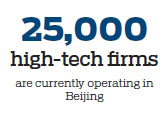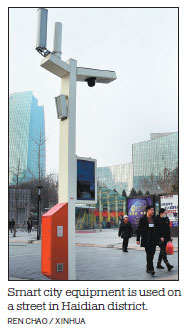Collaboration crucial to national capital's success in innovation
Beijing will have to overcome challenges on its path to developing a national science and technology innovation center, but the city can overcome those obstacles by making good use of its advantageous resources, the city's deputies said at the annual session of the 13th National People's Congress held earlier this month.
On the sidelines of the NPC session, the Beijing delegation held a news conference on March 7, sharing their insights into the city's innovative development in science and technology with journalists from home and abroad.

"Beijing is a city with the richest science and talent resources in China and also one of the cities with the greatest vitality in innovation and entrepreneurship," NPC Deputy and Mayor of Beijing Chen Jining said.
He quoted statistics to support his view: There are 90-plus higher-learning institutes, more than 1,000 research institutions, 120 key national laboratories and about 25,000 high-tech companies in the city.
The challenge, he said, is in integrating all those resources.
He said innovation cannot be successful without collaboration among the market players and between enterprises and the government. He added that the government should play its role in strategic planning and facilitating cooperation among various players.
Research and development institutions should be required to have long-term plans for their operations.
"We should give more autonomy to research institutions and encourage them to be engaged in long-term and strategic undertakings on the other hand," Chen said.
He also suggested investors be patient in their investments in high tech, especially operations related to fundamental sciences.
The mayor said talented professionals are at the core of innovation, so Beijing should introduce global intelligence while cultivating young professionals in the city.
"It is essential to have a number of professionals who are experts in technology and enthusiasts in innovation," the mayor said.
Qiu Yong, president of Tsinghua University, said universities and colleges should have a set of academic ethics that value honesty, encourage innovation and tolerate failures.
He suggested universities should use their multidisciplinary resources to conduct cross-industry research programs.
He called for deepened collaboration between universities and enterprises.
"The collaboration cannot be limited to technology transfer, but to cover a whole process from research to production," Qiu explained.
Delegates from the information technology and internet industries suggested the business community, government and citizens in general pay close attention to the opportunities that emerge from the fifth-generation communications network.
Lei Jun, founder of smartphone maker Xiaomi Group, said the 5G network will bring fundamental changes to society by integrating a raft of industries including cloud computing, smart city, medical care, autonomous driving, the internet of vehicles and the internet of things.
Yang Yuanqing, chairman of Lenovo, proposed that plans be drafted for the integration of 5G and high-tech sectors including AI with traditional manufacturing sectors.

(China Daily 03/29/2019 page7)














